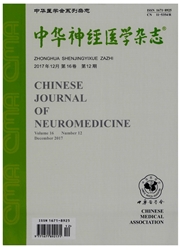

 中文摘要:
中文摘要:
目的分析精神分裂症患者健康同胞的神经认知功能。方法采用Stroop测验、数字符号编码测验、符号搜索测验、定步调听觉连续加法任务测验及威斯康星卡片分类测验评估30例精神分裂症患者健康同胞(来源于自2010年10月至2012年4月在中山大学附属第三医院精神科住院的精神分裂症患者的健康同胞)及同期体检正常的43名对照者的神经认知功能。结果精神分裂症患者健康同胞在Stroop单词(P=0.0161、Stroop色-词(P=0.001)、符号搜索正确数(P=0.005)、符号搜索错误数(P=-0.025)、符号搜索总分(符号搜索正确数减去错误数)(P=0.041)、威斯康星卡片分类测验正确数(P=-0.015)、威斯康星卡片分类测验随机错误数(P=0.005)威斯康星卡片分类测验完成分类数(P=0.041)的得分明显差于正常对照组,差异有统计学意义(P〈0.05)。结论精神分裂疗患者健康同朐可能存存执行功能及信点心钾谏序等神绎认知功能缺陷.
 英文摘要:
英文摘要:
Objective To investigate the neurocognitive functions in the healthy siblings of patients with schizophrenia. Methods Thirty healthy siblings of patients with schizophrenia and forty-three normal controls, collected in our hospital from October 2010 to April 2012, were assessed with five neurocognitive tests. These tests included Stroop Test, WAIS-III Symbolic Coding, WAIS-ⅢSymbol Search, Paced Auditory Serial Addition Task (PASAT) and Wisconsin Card Sorting Tests (WCST). Results The results of some neurocognitive tests such as word of Stroop Test (P=0.016), word-color of Stroop Test (P=-0.001), correct number of WAIS-III symbol search (P=0.005), incorrect number of WAIS-III symbol search (P=0.025), total score of WAIS-III symbol search (P=0.041), correct number of WCST (P=-0.015), randomly incorrect number of WCST (P=0.005) and completed grouping numbers of WCST (P=0.041) in the healthy siblings of patients with schizophrenia were significantly worse as compared with those in the normal controls. Conclusion The healthy siblings of patients with schizophrenia have general neurocognitive defects, such as executive function and information processing speed.
 同期刊论文项目
同期刊论文项目
 同项目期刊论文
同项目期刊论文
 Semantic fluency and executive functions as candidate endophenotypes for the early diagnosis of schi
Semantic fluency and executive functions as candidate endophenotypes for the early diagnosis of schi 期刊信息
期刊信息
